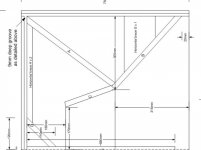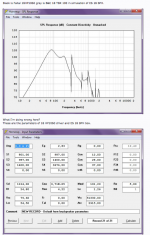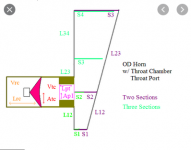Hi all, can someone help me with the hornsrep inputs, my maths is terrible plus I’m not 100% sure how to work it out in the first place. Im comparing these 3 designs and already know witch one I prefer standard, but I would like to make these 3 designs narrower and the same depth and height to see what the differences are, before I go ahead and build. I want to keep everything else the same internally just changing the external dimensions.
I want the external dimensions to be : 686mm High, 500mm Wide, 721mm Deep
If someone could do a screen shot of the input page with the changed inputs or a list of the correct inputs I would be massively appreciated.
Designs are below hopefully.
Thanks luke
I want the external dimensions to be : 686mm High, 500mm Wide, 721mm Deep
If someone could do a screen shot of the input page with the changed inputs or a list of the correct inputs I would be massively appreciated.
Designs are below hopefully.
Thanks luke
Attachments
The inputs for the ES-18BP appear to be correct here:
ES 18 BPH in Hornresp - Speakerplans.com Forums
The speaker parameters for the driver you choose must be substituted, the you should be able to reduce the cross sectional areas for the smaller cabinets accordingly, for instance S4 would go from 3676 down to 3250 for the 50x65 centimeter mouth.
ES 18 BPH in Hornresp - Speakerplans.com Forums
The speaker parameters for the driver you choose must be substituted, the you should be able to reduce the cross sectional areas for the smaller cabinets accordingly, for instance S4 would go from 3676 down to 3250 for the 50x65 centimeter mouth.
Attachments
Thank you, I’m still learning how to use hornsrep. I can enter someone else’s info no problem, but as for making changes to existing plans I haven’t a clue, I’m really badly dyslexic so as a result my maths skills is about the same as a 10 year old.
So is S4 responsible for the overall mouth area? For instance can I use 3250 as S4 in all 3 sims resulting in them all theoretically being the same high and width ?
So is S4 responsible for the overall mouth area? For instance can I use 3250 as S4 in all 3 sims resulting in them all theoretically being the same high and width ?
This might help you understand some of the Hornresp concepts:
Hornresp for Dum... hmm... Everyone 😉 | Home Theater Forum and Systems
The conversion math you need to do should be within the range of a 10 year old, only involving multiplication and division.
To convert the dimensions, visualize the horn as straight instead of folded. Drawing a diagram by hand helps me to keep track of where each section is.
Then multiply height x width at the various points (S1, S2, S3 etc.) in the horn to determine the area of the values to enter. The "L" numbers are length, so don't require any math.
The "VRC" and "VTC", Volume of Throat Chamber, and Volume of Rear Chamber math might go above a 10 year old, as it requires height x width x length and has that pesky cone shape with a magnet hanging on it in the middle ;^).
David provided a "Wizard" for figuring cone volume which can simplify those computations. Some specification sheets also include the "air volume occupied by the driver" which can be directly deducted from "VRC" or "VTC", depending in which Chamber the magnet side of the cone is placed.
The "air volume occupied by the driver" considers the driver as rear mounted, while in the ES-18BP the driver is front mounted, so the volume of the speaker cut out hole and mounting flange should be reduced from the "air volume occupied by the driver".
Good Luck!
Art
Hornresp for Dum... hmm... Everyone 😉 | Home Theater Forum and Systems
The conversion math you need to do should be within the range of a 10 year old, only involving multiplication and division.
To convert the dimensions, visualize the horn as straight instead of folded. Drawing a diagram by hand helps me to keep track of where each section is.
Then multiply height x width at the various points (S1, S2, S3 etc.) in the horn to determine the area of the values to enter. The "L" numbers are length, so don't require any math.
The "VRC" and "VTC", Volume of Throat Chamber, and Volume of Rear Chamber math might go above a 10 year old, as it requires height x width x length and has that pesky cone shape with a magnet hanging on it in the middle ;^).
David provided a "Wizard" for figuring cone volume which can simplify those computations. Some specification sheets also include the "air volume occupied by the driver" which can be directly deducted from "VRC" or "VTC", depending in which Chamber the magnet side of the cone is placed.
The "air volume occupied by the driver" considers the driver as rear mounted, while in the ES-18BP the driver is front mounted, so the volume of the speaker cut out hole and mounting flange should be reduced from the "air volume occupied by the driver".
Good Luck!
Art




